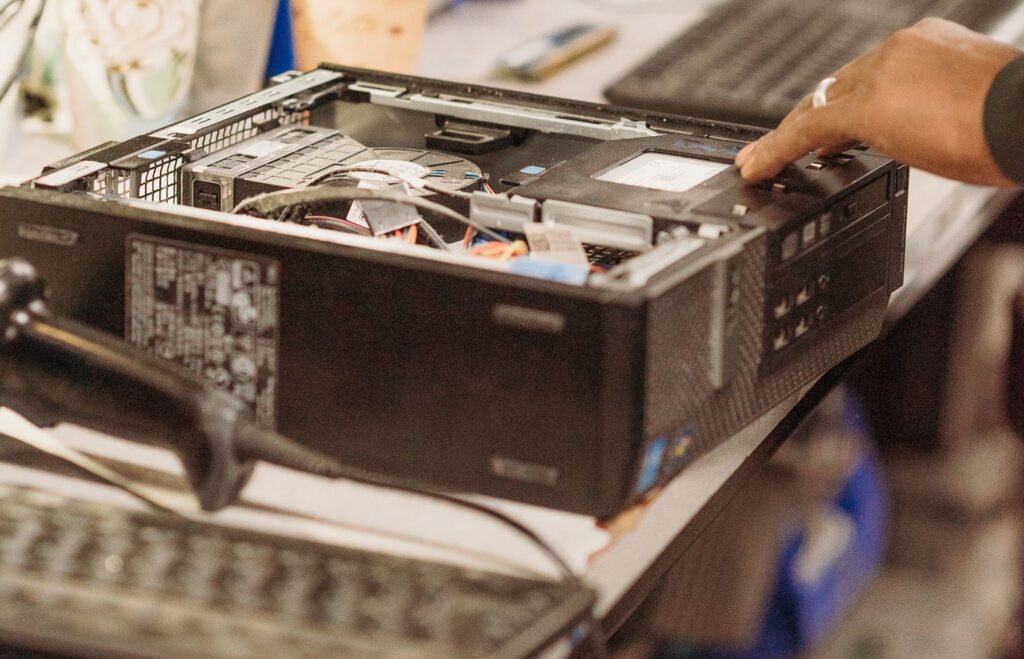
There’s value in e-waste says Christopher Quirk from Dell Technologies
Look around you and odds are you’ll encounter a ton of obsolete or useless electronics that are simply lying fallow around your home – that old phone that gave up the ghost last Christmas, that old video player when VCR was a thing, old fitness bands where the strap broke and you never got around to fixing it. In today’s tech-laden society, to say that we generate a ton of e-waste is an understatement of epic proportions.
According to Christopher Quirk, SVP of Professional Consulting and Managed Services at Dell Technologies, more than 57 million tons of electronics will be discarded in 2022 which is enough to the weight of 82,000 school buses. Yet, only 17.4% of this is recycled every year leaving a huge amount just lying there.

Christopher Quirk, SVP of Professional Consulting and Managed Services at Dell Technologies
In his role at Dell Technologies, Christopher has a unique perspective and a chance to tackle one of the fast-growing global environmental challenges facing us at this point in time. As part of their ongoing global efforts to sustainability, Dell Technologies’ is taking the lead in helping to extend the usable life of electronics such as their prior Concept Luna design as well as existing designs like the Latitude 5000 series and recycling older electronics too via their Asset Recovery Services. Chris pens down his thoughts on Dell’s sustainability programmes in light of ‘E-Waste Day’
The following text is reproduced verbatim from Christopher Quirk’s post on Dell Technologies’ official site. For more details and to read the whole feature in its entirety check out https://www.dell.com/en-us/blog/unlocking-the-value-in-ewaste/
Unlocking the value in e-waste
by Christopher Quirk, SVP of Professional, Consulting and Managed Services
Dell’s innovative programs drive progress toward our goal to take back as much as we produce
Today is International E-Waste Day. This year’s theme – “recycle it all, no matter how small” – reminds us that discarded, unused electronics, or e-waste, present one of the fastest-growing global environmental challenges of our time.
It is estimated that more than 57 million tons of electronics will be discarded this year. This is equivalent in weight to 82,000 school buses or 4,700 Eiffel Towers – enough to cover the size of Manhattan – and that’s just e-waste production in a single year. Only 17.4 percent of that volume is recycled as e-waste each year.
When returned for reuse or recycling, end-of-life electronics contain valuable, reusable components, parts and minerals that can be responsibly harvested for other uses. The carbon footprint of electronics shrinks when components and materials are reused because we extend their life. And for every pound of steel, aluminum, plastic or copper we recover for reuse, we save a pound of material from being newly manufactured or extracted from the ground.
End-of-life electronics returned through our Dell Technologies’ recovery and recycling services are given a second chance. We extend their usable life and accelerate the circular economy. In fact, we have recovered more than 2.6 billion pounds of used electronics since 2007.
To avoid turning end-of-life electronics into e-waste, we work to unlock their value:
- Design for circularity – we imbed circular principles into every aspect of product design.
- Repairability – We make it easy for consumers to repair a device by providing product manuals online, offering services like our Dell AR Assistant, and designing for better repairability. The longer we keep our electronics in use, the greater the impact.
- Take back services – We provide convenient services to recover and recycle end-of-life devices when the technology no longer meets a user’s needs.
- Maximise reuse – Once a device is returned, we maximise its reuse potential by taking the following steps:
- Sanitise and secure data
- Refurbish systems that can be resold or donated for continued use
- Harvest all usable parts to extend the lifecycle
- Extract key materials – like plastics, magnets and aluminum – to reuse in new Dell products
- Responsibly recycle all other materials
We understand the value of legacy electronics – both for our commitment to circularity and for the health of the planet. In fact, we have set an ambitious goal to tackle this challenge, which is by 2030, for every product a customer buys, we will reuse or recycle an equivalent product.
In addition to our existing recycling services, we continue to find innovative new ways to make it easier for people and businesses to return their used electronics. In the last year, we launched pilot programs to raise awareness about the importance of electronics recycling and to drive people to act:
- We reached consumers who purchased certain laptop models with an on-package recycling message encouraging them to reuse the box to return their old equipment.
- We tested an innovative service that uses delivery lockers in apartment buildings. This campaign encouraged apartment dwellers to deposit unwanted electronics in shipping lockers for recycling.
- We joined forces with technology peers to pilot a curbside recycling program for consumers in Denver, Colorado.
- And, for business customers of all sizes, we modernised Dell’s Asset Recovery Services globally – now supporting 36 countries and available through our channel partners.
We established our global recycling services more than 25 years ago and we continue to evolve to keep pace with changing consumer and business demands. We are driving innovation to increase the volume of products (of any brand, not just Dell) for refurbishment, reuse and recycling.
Help us put a dent in e-waste by trading in or recycling your end-of-life device today. Visit Dell’s Recycling Solutions page for more information and to learn how. We’ll take it all – no matter how small – as we continue to unlock the value in e-waste.
